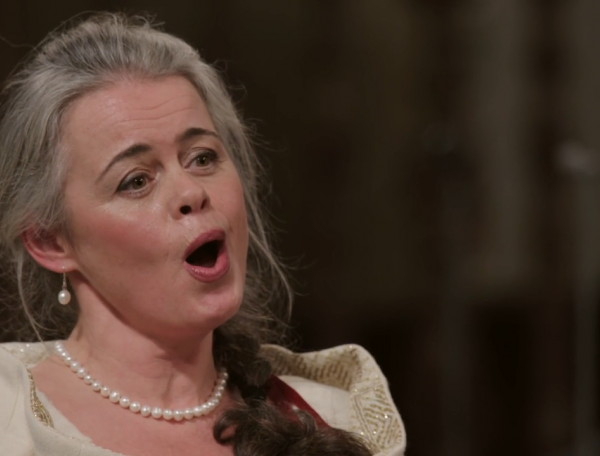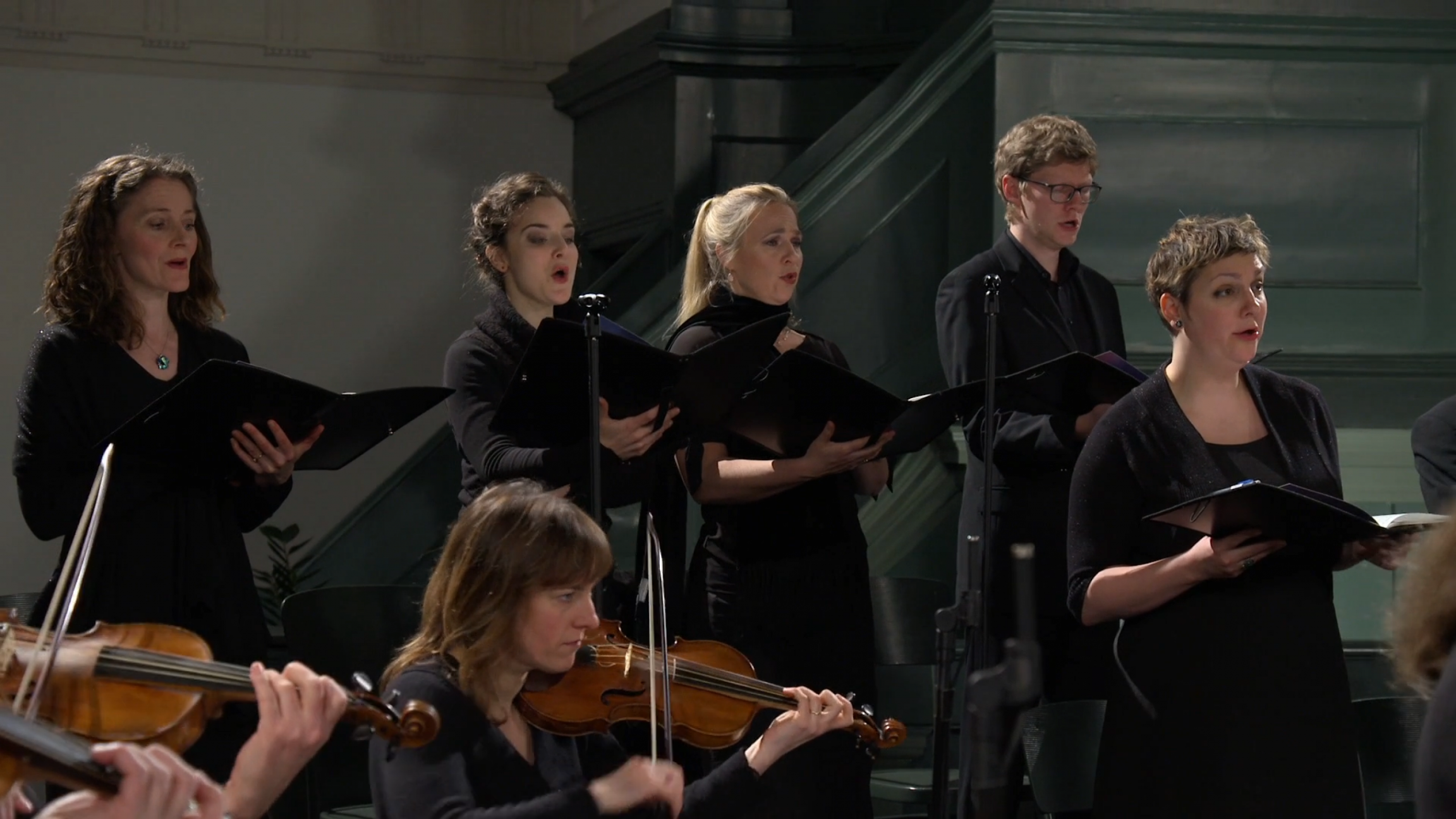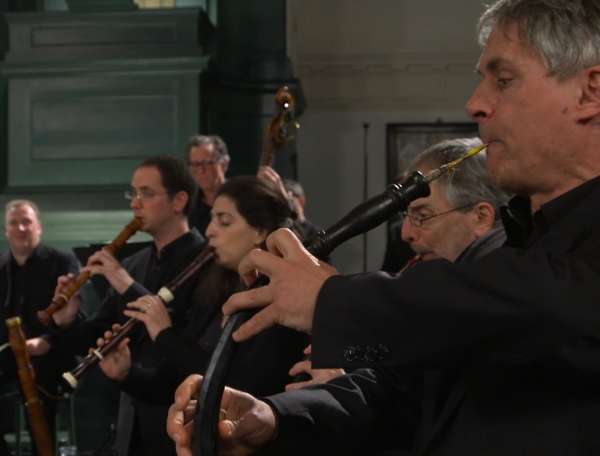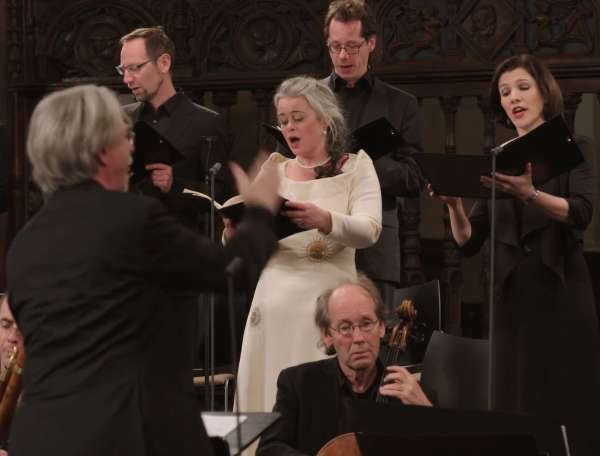

Darzu ist erschienen der Sohn Gottes
BWV 40 performed by the Netherlands Bach Society
conducted by Hans-Christoph Rademann
Grote Kerk, Harlingen
Behind the music
Heroic horns
The birth of Christ is celebrated with a triumphant flourish
Two horns enter heroically in Darzu ist erschienen der Sohn Gottes: the Son of God has appeared and conquered the devil. The triumphant flourish is reminiscent of the equally joyful trumpets in the first cantata of the Christmas Oratorio. The choir enter in unison, followed by a fugue, and then the piece ends homophonically again.
Bach clearly wanted to make an impression at his first Christmas time as cantor in Leipzig. In the tenor’s recitative, “the Word became flesh and dwelt among us”. You then hear how brightly the light shines in an elated upward line of semiquavers. The victorious Christ of this cantata is closer to the regal figure of the St John Passion than the hesitant Jesus of the St Matthew Passion. The humble chorale that follows the recitative makes reference to evil being defeated. And the short bass aria, in which the infernal serpent is taught a lesson, is absolutely triumphant. “You hear this devilish serpent slithering through the score as a chain of semiquavers. This is a case of theological exaggeration; it is a huge serpent! Although evil is conquered in the recitative that follows, a little temptation remains nonetheless”, says conductor Hans-Christoph Rademann.
The horns make a heroic return in the tenor aria, in which the singer’s drawn-out syllables joyfully decorate the runs of the wind instruments. Take note, too, of the expressive final upward movement of the closing chorale: Jesus is on earth, our gaze is turned towards the sun in the heavens.
- BWV
- 40
- Title
- Darzu ist erschienen der Sohn Gottes
- Instrument
- alto, bass, tenor
- Genre
- cantatas
- Year
- 1723
- City
- Leipzig
- Lyricist
- unknown
- Occasion
- Boxing Day
- First performance
- 26 December 1723
- Special notes
- Bach later reworked the opening chorus into the Cum sancto spiritu of his Mass in F major, BWV 233.
Extra videos
Vocal texts
Original
1. Chor
Dazu ist erschienen der Sohn Gottes,
dass er die Werke des Teufels zerstöre.
2. Rezitativ (Tenor)
Das Wort ward Fleisch
und wohnet in der Welt,
das Licht der Welt bestrahlt
den Kreis der Erden,
der große Gottessohn
verlässt des Himmels Thron,
und seiner Majestät gefällt,
ein kleines Menschenkind zu werden.
Bedenkt doch diesen Tausch,
wer nur gedenken kann;
der König wird ein Untertan,
der Herr erscheinet als ein Knecht
und wird dem menschlichen Geschlecht
– o süßes Wort in aller Ohren! –
zu Trost und Heil geboren.
3. Choral
Die Sünd macht Leid;
Christus bringt Freud,
weil er zu Trost in diese Welt ist kommen.
Mit uns ist Gott
nun in der Not:
Wer ist, der uns als Christen kann verdammen?
4. Arie (Bass)
Höllische Schlange,
wird dir nicht bange?
Der dir den Kopf als ein Sieger zerknickt,
ist nun geboren,
und die verloren,
werden mit ewigem Frieden beglückt.
5. Rezitativ (Alt)
Die Schlange, so im Paradies
auf alle Adamskinder
das Gift der Seelen fallen ließ,
bringt uns nicht mehr Gefahr;
des Weibes Samen stellt sich dar,
der Heiland ist ins Fleisch gekommen
und hat ihr alles Gift benommen.
Drum sei getrost, betrübter Sünder!
6. Choral
Schüttle deinen Kopf und sprich:
Fleuch, du alte Schlange!
Was erneur’st du deinen Stich,
machst mir angst und bange?
Ist dir doch der Kopf zerknickt,
und ich bin durchs Leiden
meines Heilands dir entrückt
in den Saal der Freuden.
7. Arie (Tenor)
Christenkinder, freuet euch!
Wütet schon das Höllenreich,
will euch Satans Grimm erschrecken:
Jesus, der erretten kann,
nimmt sich seiner Küchlein an
und will sie mit Flügeln decken.
8. Choral
Jesu, nimm dich deiner Glieder
ferner in Genaden an;
schenke, was man bitten kann,
zu erquicken deine Brüder:
Gib der ganzen Christenschar
Frieden und ein sel’ges Jahr!
Freude, Freude über Freude!
Christus wehret allem Leide.
Wonne, Wonne über Wonne!
Er ist die Genadensonne.
Translation
1. Chorus
For this purpose the Son of God was manifested,
that He might destroy the works of the devil.
2. Recitative (Tenor)
The Word was made flesh
and dwells in the world,
the light of the world
irradiates the globe,
the mighty Son of God
leaves the throne of heaven,
and it pleases His majesty
to become a little creature.
Give thought to this exchange,
all who can think:
the King becomes a subject,
the Lord appears as a servant
and is born for this race of man
– O sweet word in all men’s ears –
to heal and comfort.
3. Chorale
Sin brings sorrow;
Christ brings joy,
for He has entered this world to console.
God is with us
now in our need:
who could condemn us now we are Christians?
4. Aria (Bass)
Hellish serpent
do you not grow frightened?
The victor who shall crush your head
is now born
and all the fallen
shall be favoured with eternal peace.
5. Recitative (Alto)
The serpent that in paradise
made fall on all of Adam’s children
the venom of souls
no longer endangers us;
woman’s seed is made manifest,
the Saviour has appeared in flesh
and has removed all venom.
Take comfort then, O troubled sinner.
6. Chorale
Shake your head and say:
Flee, you ancient serpent!
Why renew your sting
for my fear and anguish?
After all, your head is dashed,
and I, through the Passion
of my Saviour, have fled from you
into the hall of gladness.
7. Aria (Tenor)
Christian children, now rejoice!
Though hell’s domain now rages,
though Satan’s fury would frighten you:
Jesus, who can save,
will gather His chickens
under His wing.
8. Chorale
Jesus, continue to look after
Thy members with loving grace;
give, whatever we ask,
to revive Thy brethren:
give to all the Christian throng
peace and a blessèd year!
Joy, joy, unending joy!
Christ shall ward off all sorrow.
Bliss, bliss, unending bliss!
He is the sun of grace.
Credits
-
- Release date
- 14 December 2018
-
- Recording date
- 23 January 2016
-
- Location
- Grote Kerk, Harlingen
-
- Conductor
- Hans-Christoph Rademann
-
- Alto
- Barnabás Hegyi
-
- Tenor
- Daniel Johannsen
-
- Bass
- Matthew Brook
-
- Ripieno soprano
- Zsuzsi Tóth, Lauren Armishaw, Lucie Chartin
-
- Ripieno alto
- Elsbeth Gerritsen, Bart Uvyn
-
- Ripieno tenor
- Immo Schröder, Kevin Skelton
-
- Ripieno bass
- Sebastian Myrus, Drew Santini
-
- Violin 1
- Sayuri Yamagata, Anneke van Haaften, Annelies van der Vegt
-
- Violin 2
- Pieter Affourtit, Hanneke Wierenga, Lidewij van der Voort
-
- Viola
- Staas Swierstra, Jan Willem Vis
-
- Cello
- Lucia Swarts, Richte van der Meer
-
- Double bass
- Robert Franenberg
-
- Oboe
- Martin Stadler, Peter Frankenberg
-
- Bassoon
- Benny Aghassi
-
- Horn
- Erwin Wieringa, Gijs Laceulle
-
- Organ
- Bart Naessens
-
- Harpsichord
- Siebe Henstra
-
- Director
- Simon Aarden
-
- Music recording
- Guido Tichelman, Bastiaan Kuijt, Micha de Kanter
-
- Music edit and mix
- Guido Tichelman
-
- Camera
- Bart ten Harkel, Thijs Struick, Chris Reichgelt
-
- Lights
- Daan de Boer, Arjen Seykens
-
- Assistant director
- Ferenc Soetman
-
- Video engineer
- Vincent Nugteren
-
- Set technique
- Martin Struijf, Glenn van den Eerden, Marco Korzelius
-
- Data handling
- Jasper Blok
-
- Project manager nep
- Peter Ribbens
-
- Interview
- Gijs Besseling, Jan Van den Bossche
-
- Producer concert
- Imke Deters
-
- Productie film
- Marco Meijdam
Discover
Help us to complete All of Bach
There are still many recordings to be made before the whole of Bach’s oeuvre is online. And we can’t complete the task without the financial support of our patrons. Please help us to complete the musical heritage of Bach, by supporting us with a donation!

